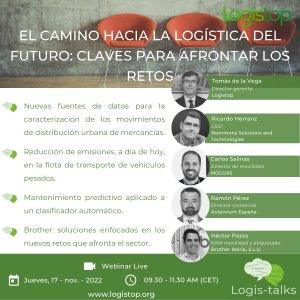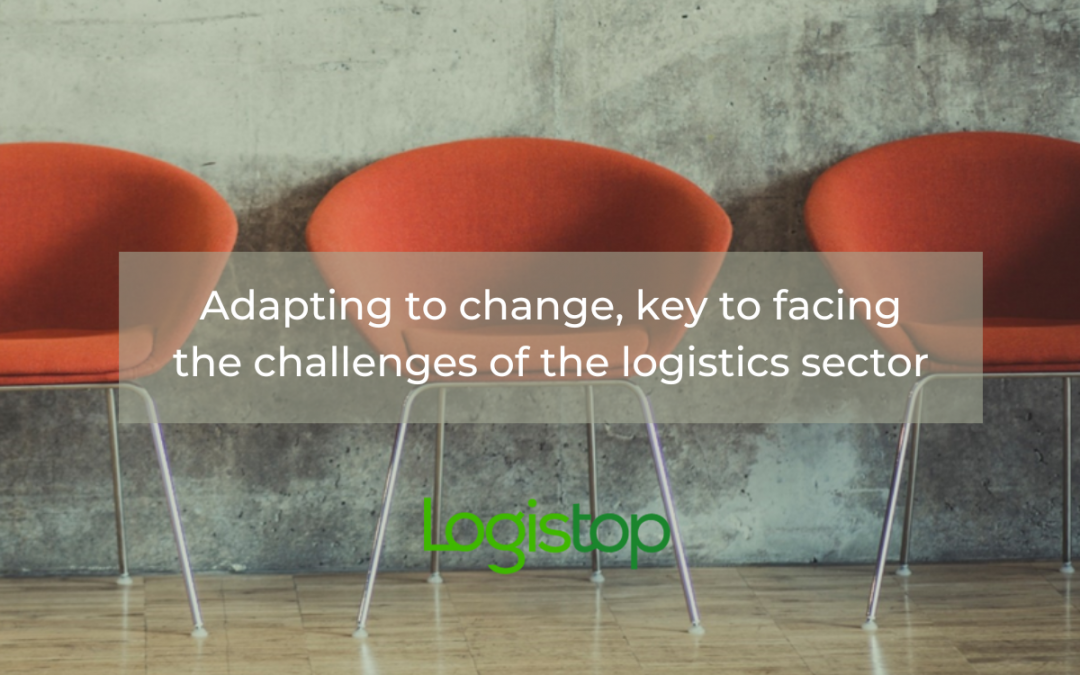- The change in consumer habits has modified the distribution patterns of goods in cities.
- Avoiding the collapse resulting from the rise of e-commerce is one of the main challenges to be faced.
- Concern about reducing CO2 emissions is growing among transport companies.
In Logis-Talks “The road to the logistics of the future: keys to face the challenges” we analysed and debated which are the challenges that logistics and transport must face and how to face them. Ricardo Herranz, CEO, Nommon Solutions and Technologies, Carlos Salinas, Director of Mobility, MOLGAS, Ramón Pérez, Commercial Director, Actemium España, yHéctor Pazos, KAM Mobility and Labelling, Brother Iberia, S.L.U., as well as the presentation and moderation of Tomás de la Vega, Managing Director, Logistop.

New data sources for the characterisation of urban goods distribution movements
The change in consumer habits, together with the recent context, has generated a growth in e-commerce and a modification in the distribution patterns of goods in cities.
Therefore, as Ricardo Herranz pointed out, anonymised mobile phone data, which are already commonly used to study the mobility of people, offer opportunities to characterise these changes. In addition, Herranz explained to the attendees some experiences of the use of this data that Nommon is developing for the analysis of urban goods distribution movements, as well as the lines of work that are being explored in research projects. The experiences were: analysis of the hinterland of the Port of Barcelona; mobility of goods vehicles in the province of Guipúzcoa; and the impact of e-commerce on mobility in Bogotá.
“In freight mobility we have very fragmented information and the availability of new sources of big data and artificial intelligence can open up new opportunities”
Ricardo Herranz, CEO, Nommon Solutions and Technologies
Emission reductions in today’s heavy goods vehicle fleet
According to a study by Cambridge Econometrics in 2021, Spain is the third country in the European Union with the highest volume of road freight transport. In 2020, around 22% of the fleet will be more than 20 years old and 29% between 15 and 20 years old. New heavy-duty vehicles between 2025-30 will have to emit on average 15-30% less compared to the EU average CO2 emissions per tonne km of new vehicles sold from July 2019 to June 2020. All this with the aim of meeting the EU’s commitment to achieve climate neutrality by 2050.
In this regard, and based on what transport companies are currently demanding from Molgas, Carlos Salinas highlighted the existing concern regarding the reduction of CO2 emissions, as more and more shippers are requesting certificates that indicate that this reduction is really taking place. The measurement of CO2 emissions per trip, as Salinas pointed out, entails the need to know a significant amount of data that shippers do not always have at their disposal. This is where digitalisation becomes even more important to improve the management and provision of such data, as there are many cases in which shippers have had to reduce their transport providers due to a lack of data.
“In terms of reference standards for emissions, there is currently no European standard; each country sets a different regulation or standard, which is a handicap. There is a need for a common standard at European level”
Carlos Salinas, Director of Mobility, MOLGAS
Predictive maintenance applied to an automatic sorter
The application of a predictive maintenance system can be used to reduce maintenance costs and avoid production stoppages for customers in the parcel/postal segment through different maintenance techniques in a user-friendly way, as Ramón Pérez analysed.
To do so, Pérez based his presentation on the example of predictive maintenance applied to an automatic sorter, taking into account the requirements of corrective maintenance and the consequences of a shutdown, and analysed how, through the application of a predictive maintenance system, it is possible to: 1) anticipate possible future failures; 2) guarantee its availability; 3) reduce production shutdowns to a minimum; 4) reduce the amount of preventive maintenance; and 5) optimise the stock of spare parts.
“The application of a predictive maintenance system reduces maintenance costs and avoids production stoppages”
Ramón Pérez, Commercial Director, Actemium Spain
Solutions focused on the new challenges facing the sector
As has been discussed throughout the session, the sector is changing very rapidly, partly due to new technologies and the new demands of the consumer, who needs greater speed and versatility.
Héctor Pazos highlights the following as the main challenges that the sector must face: time management (customers increasingly demand greater immediacy), greater social responsibility (with more sustainable deliveries), new, more personalised delivery requirements and, above all, the boom experienced by e-commerce in recent years. In order to meet these challenges, Pazos analysed how Brother is working on different products and solutions to respond quickly and efficiently to any need, highlighting, for example, the implementation of RFID systems or the use of portable equipment.
“The e-commerce boom has increased the pressure on the logistics sector and adapting to this pressure and avoiding collapse is the main challenge facing the sector. To achieve this, investment in technology is fundamental and a priority”
Héctor Pazos, KAM mobility and labelling, Brother Iberia, S.L.U.
The road to the logistics of the future: keys for facing the challenges
At the end of the speeches, a round table discussion was held, moderated by Tomás de la Vega, in which different factors related to the present and future of logistics and transport were analysed.
In this sense, Héctor Pazos emphasised that the greatest threat that the sector must face and that, at the same time, is an advantage is the rise of e-commerce. This means that companies in the sector must adapt to this new situation, otherwise they run the risk of being swallowed up and overtaken. However, Pazos adds that, at the same time, this context creates an opportunity for all those who manage to adapt, being necessary to focus resources on strengthening themselves in order to supply and provide service as efficiently as possible.
As far as the present and future of new fuels in heavy transport is concerned, Carlos Salinas considers that natural gas still has a long way to go, since, although it has always been said to be a transition fuel, it is undergoing its own transition process: from fossil gas to biogas. Likewise, Salinas considers that biomethane also has a long way to go, especially in Spain, where it is experiencing a significant delay. For its part, the electric vehicle is gaining ground in tourism and the last mile, while pilots are being carried out in heavy transport, but the infrastructure needed is a problem. Finally, in terms of hydrogen, Salinas believes that in heavy transport it is going a little slower and that it will not be until 2026 that there will be a real increase in its commercialisation.
On the question of how preventive maintenance can help to reduce the carbon footprint of companies, Ramón Pérez pointed out that one of the consequences of applying this maintenance system is the optimisation in the reduction of preventive maintenance and spare parts management, which means a reduction in the impact generated.
Finally, aspects of what measures/policies can be adopted to facilitate the sharing of information while protecting its confidentiality were discussed. Thinking about different areas of logistics and transport, Ricardo Herranz considers that data sharing is a benefit for the entire sector by providing a snapshot of the demand and mobility of goods. To this end, Herranz adds, he analyses possible solutions to address the existing barriers to the sharing of valuable information, from tougher regulation to the creation of incentives for information sharing, the key being always to guarantee the security of the information.
About Logistop
Logistop is the benchmark workspace for collective innovation through the realisation of projects hand in hand with our members. Transforming the entire supply chain into a more efficient and sustainable one. All this with the aim of articulating and carrying out innovation projects among the members, without excluding the possibility of collaborating with or receiving support from certain organisations outside Logistop.

